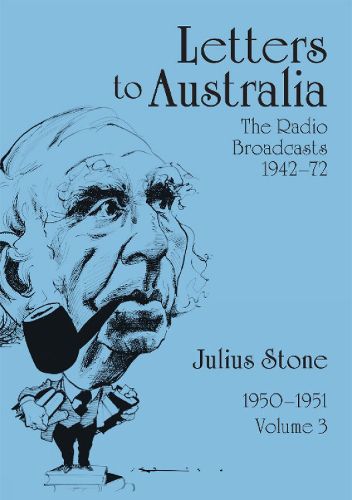Readings Newsletter
Become a Readings Member to make your shopping experience even easier.
Sign in or sign up for free!
You’re not far away from qualifying for FREE standard shipping within Australia
You’ve qualified for FREE standard shipping within Australia
The cart is loading…






Originally broadcast by the ABC between 1942 and 1972 and re-discovered in 2006, these conversational opinion pieces by jurist Julius Stone take the reader back to the mid-20th century, bringing to life the people, events and the sweep of affairs during World War II and its turbulent aftermath.
More than anyone else at that time, Stone gave Australians a sense that they were part of the world and that they could - and - seek to influence world events. His broadcasts give a unique insight into Australia’s changing sense of its place in the world during World War II and the postwar years, and of the hopes and fears of that era.
Julius Stone returned from overseas in early 1950 and quickly resumed broadcasting. Through 1950 and 1951, the issues that attracted his analysis were disarmament, the growth of McCarthyism in the United States, the formal division of Germany, and the war in Korea. The intervention of China, indoctrination, brainwashing and human rights raised by prisoners of the war are covered in many essays.
$9.00 standard shipping within Australia
FREE standard shipping within Australia for orders over $100.00
Express & International shipping calculated at checkout
Originally broadcast by the ABC between 1942 and 1972 and re-discovered in 2006, these conversational opinion pieces by jurist Julius Stone take the reader back to the mid-20th century, bringing to life the people, events and the sweep of affairs during World War II and its turbulent aftermath.
More than anyone else at that time, Stone gave Australians a sense that they were part of the world and that they could - and - seek to influence world events. His broadcasts give a unique insight into Australia’s changing sense of its place in the world during World War II and the postwar years, and of the hopes and fears of that era.
Julius Stone returned from overseas in early 1950 and quickly resumed broadcasting. Through 1950 and 1951, the issues that attracted his analysis were disarmament, the growth of McCarthyism in the United States, the formal division of Germany, and the war in Korea. The intervention of China, indoctrination, brainwashing and human rights raised by prisoners of the war are covered in many essays.